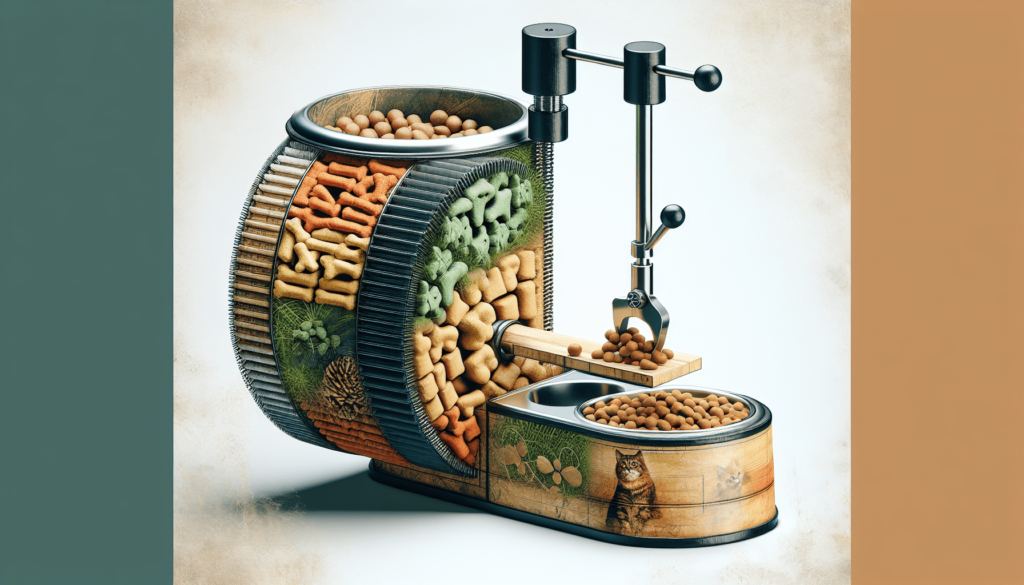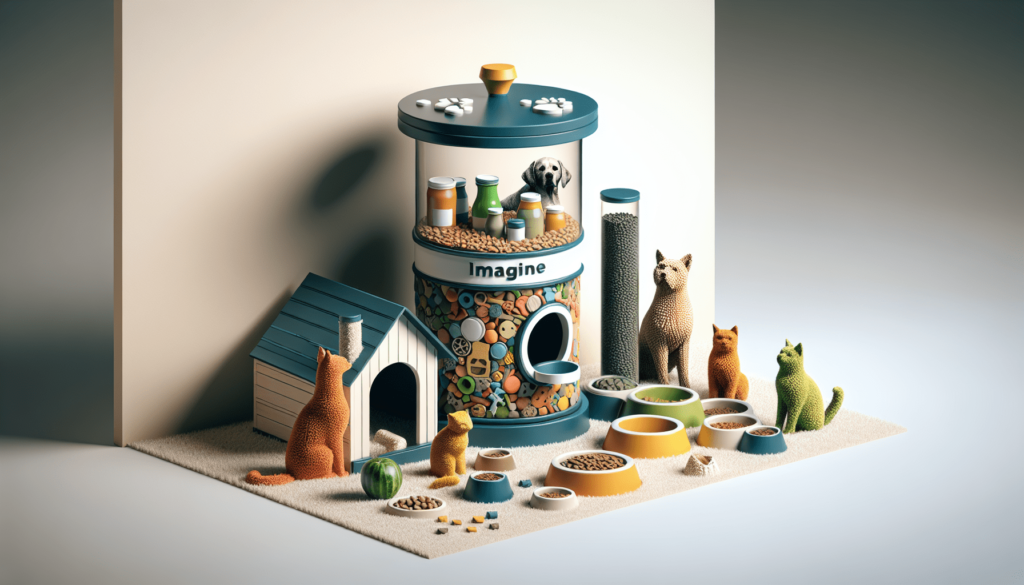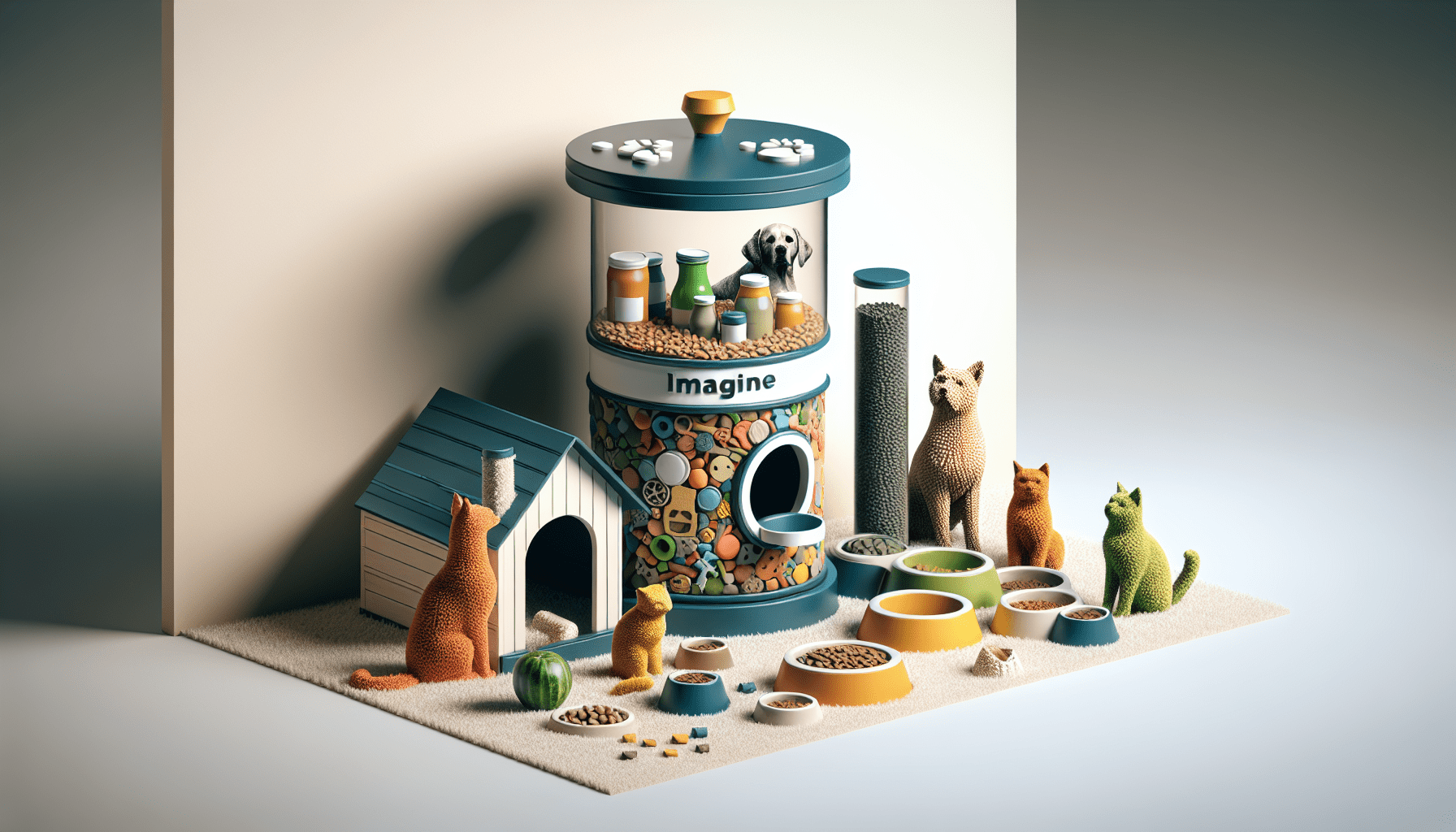If you’re a pet owner who is passionate about environmental sustainability, then you’ll be intrigued by the concept of zero-waste pet care. As the name suggests, it involves minimizing waste and making eco-friendly choices in all aspects of caring for your furry companion. From opting for biodegradable poop bags to choosing sustainable pet food options, this innovative approach not only benefits the planet but also ensures the well-being of your pet. So, join the movement towards a greener pet care routine and discover how you can make a difference, one paw-print at a time.
Benefits of Zero-Waste Pet Care
Reduced Environmental Impact
Zero-waste pet care is not only beneficial for our furry friends but also for the environment. By embracing a zero-waste lifestyle for our pets, we can significantly reduce the amount of waste we produce, thereby minimizing our ecological footprint. When we opt for sustainable pet care practices, we play a vital role in reducing the excessive waste that often ends up in landfills or pollutes our oceans. By making simple changes to our pet care routine, we can contribute to a cleaner and healthier planet for future generations.
Healthier for Pets
Another significant advantage of zero-waste pet care is that it promotes the overall health and well-being of our beloved companions. Many commercial pet products and foods contain harmful chemicals, additives, and preservatives that can have a detrimental impact on our pets’ health. By adopting a zero-waste approach, we have greater control over what our pets consume or are exposed to, allowing us to prioritize their health. Zero-waste pet care encourages the use of natural, organic, and homemade alternatives that are free from harmful toxins, ensuring our pets lead healthier and happier lives.
Cost Savings
Contrary to popular belief, embracing zero-waste pet care can also be financially rewarding! By making small changes to our pet care routine, such as opting for homemade pet food or using natural grooming products, we can significantly reduce our expenses in the long run. Commercial pet products often come with a hefty price tag, whereas sustainable alternatives are often more affordable and sometimes even cost-effective. By eliminating unnecessary waste and investing in reusable and eco-friendly products, we can save money while still providing our pets with the care they deserve.
Zero-Waste Pet Food Options
Homemade Pet Food
One of the most effective ways to minimize waste in pet care is by preparing homemade pet food. By creating nutritious meals from scratch using fresh ingredients, you can have full control over what goes into your pet’s bowl. This approach eliminates the need for wasteful packaging commonly found with store-bought pet food. Additionally, it allows you to cater to any dietary restrictions or allergies your pet may have, ensuring they receive the nourishment they need without compromising their health.
Bulk-Buying Pet Food
For those who prefer the convenience of pre-packaged pet food, buying in bulk is an excellent zero-waste option. Purchasing larger quantities of pet food not only reduces packaging waste but also minimizes the frequency of shopping trips. Look for pet food stores or suppliers that offer bulk-buying options, preferably using reusable or recyclable packaging. By buying in larger quantities, you not only contribute to a more sustainable pet care routine but also enjoy cost savings in the process.
Buying Insect-Based Pet Food
In recent years, the pet food industry has seen a rise in insect-based pet food options. Insects, such as crickets or mealworms, are highly nutritious and protein-rich, making them an excellent alternative to traditional pet food. In addition to being a sustainable protein source, insect-based pet food often comes in eco-friendly packaging, reducing waste. By choosing insect-based pet food, you can provide your pet with a nutritious and sustainable meal while minimizing your environmental impact.

Eco-Friendly Pet Toys
Upcycled and DIY Toys
When it comes to pet toys, there are countless creative ways to reduce waste while keeping our furry friends entertained. Upcycled toys, made from repurposed materials, offer a fun and environmentally friendly option. Transform old t-shirts or socks into braided tug-of-war ropes or sew old fabric scraps into interactive puzzle toys. DIY toys not only minimize waste but also allow you to customize them to your pet’s preferences, ensuring hours of enjoyment.
Natural and Biodegradable Toys
Opting for natural and biodegradable toys is another fantastic way to embrace a zero-waste pet care routine. Look for toys made from sustainable materials such as hemp, organic cotton, or natural rubber. These materials are not only better for the environment but are also safer for your pets, as they are free from harmful chemicals or toxins often found in plastic toys. When your pet has finished enjoying their toy, you can rest assured knowing it will naturally break down without leaving a lasting impact on the environment.
Interactive Puzzle Toys
Interactive puzzle toys not only stimulate your pet’s mind but can also be a sustainable choice for playtime. Rather than opting for single-use toys, consider investing in durable puzzle toys that challenge your pet’s problem-solving skills. These toys are often made of high-quality materials that can withstand the test of time, reducing the need for constant replacements. By choosing long-lasting and mentally stimulating toys, you can minimize waste while providing your pet with hours of entertainment.
Zero-Waste Pet Grooming
Homemade Grooming Products
Traditional grooming products often come in plastic packaging and contain chemicals that can be harmful to both the environment and our pets’ well-being. By making your own grooming products at home, you can reduce waste and ensure that only natural, pet-safe ingredients are used. From DIY pet shampoos to homemade conditioners and paw balms, there are plenty of recipes available that utilize simple and eco-friendly ingredients. Not only will your pet benefit from chemical-free grooming, but you can also enjoy the satisfaction of knowing exactly what goes into their care routine.
Natural and Eco-Friendly Shampoos
If crafting your own grooming products seems daunting, there are plenty of natural and eco-friendly pet shampoos available on the market. Look for products that use organic ingredients and are packaged in recyclable or biodegradable materials. These shampoos are free from harmful chemicals that can irritate your pet’s skin, minimizing the risk of allergies or discomfort. By choosing sustainable grooming options, you can indulge your pet in a pampering session while reducing your environmental impact.
Brushes made of Natural Materials
When it comes to brushing your pet’s fur or bristles, opt for brushes made of natural materials, such as bamboo or wood. These brushes are not only durable but also eco-friendly, as they are often biodegradable and sustainably sourced. By investing in a high-quality brush, you can effectively groom your pet while reducing waste and contributing to a more sustainable pet care routine.

Reducing Pet Waste
Biodegradable Pet Waste Bags
Proper waste disposal is a crucial aspect of zero-waste pet care. Instead of using plastic bags to pick up after your pet, choose biodegradable waste bags made from compostable materials. These bags break down naturally, minimizing their impact on the environment. Look for options that are certified compostable to ensure they are truly eco-friendly. By using biodegradable pet waste bags, you can take care of your pet’s waste responsibly while minimizing the amount of plastic that ends up in landfills or pollutes our oceans.
Composting Pet Waste
Composting pet waste is an environmentally friendly way to dispose of your furry friend’s waste. While it may not be suitable for all situations or living arrangements, composting can be a viable option if you have space and the necessary resources. It is important to note that pet waste composting should be kept separate from regular compost used for plants, as pet waste may contain harmful bacteria. By composting your pet’s waste, you can turn it into a valuable resource for your garden or landscaping while minimizing the amount of waste that goes to landfills.
Training Pets for Indoor Elimination
For pet owners living in urban environments or apartments, training pets for indoor elimination can be a zero-waste solution. By using eco-friendly alternatives to disposable puppy pads or synthetic grass, you can create an indoor elimination area that minimizes waste. Consider using washable, reusable pads or natural grass patches that can be easily cleaned and maintained. By training your pets to use these alternatives, you can significantly reduce waste associated with outdoor walks or disposable options.
Eco-Conscious Pet Accessories
Recycled or Upcycled Pet Collars and Leashes
When it comes to pet accessories, consider opting for recycled or upcycled collars and leashes. Many companies now offer pet accessories made from materials such as recycled plastic bottles or upcycled fabrics. These accessories not only reduce waste but also provide a sturdier and more durable option for your pet. By choosing eco-conscious accessories, you can keep your pet stylish while minimizing your carbon footprint.
Sustainable Pet Beds
Choosing sustainable pet beds is another great way to embrace zero-waste pet care. Look for beds made from organic materials, such as organic cotton or natural latex, that are free from harmful chemicals or synthetic fabrics. These beds are not only comfortable and durable but also more environmentally friendly than traditional pet beds. Additionally, some companies offer beds made from recycled materials, further reducing waste. By providing your pet with a sustainable bed, you can ensure their comfort while reducing their ecological impact.
Reusable Pet Clothing
While pet clothing may not be a necessity for all pets, if you do dress up your furry friend, consider investing in reusable options. Instead of purchasing cheap, disposable outfits that create unnecessary waste, choose high-quality clothing made from sustainable fabrics. Look for items that can be easily cleaned and reused, reducing the need for constant replacements. By adopting reusable pet clothing, you can keep your pet looking stylish while minimizing your environmental impact.
Sustainable Pet Travel
Eco-Friendly Pet Carriers
When traveling with your pet, opt for eco-friendly pet carriers made from sustainable materials. Look for carriers made from recycled or upcycled materials, such as recycled plastic or repurposed fabrics. These carriers are not only more environmentally friendly but often more durable and comfortable for your pet. Additionally, choose carriers that are the appropriate size for your pet, as this ensures their safety and comfort during travel. By selecting sustainable pet carriers, you can enjoy peace of mind knowing that your pet is traveling in style while minimizing their carbon footprint.
Public Transportation for Pets
While it may not always be feasible, using public transportation for pet travel is an eco-friendly option to consider. Many cities allow small pets to travel on public buses or trains, reducing the need for additional car trips. Before embarking on your journey, familiarize yourself with the pet policies of your local transportation services. By utilizing public transportation, you can reduce emissions and contribute to a more sustainable pet travel routine.
Carbon Offset Programs for Pet Travel
For longer journeys that require air travel or significant driving distances, consider participating in carbon offset programs. These programs allow you to counterbalance the carbon emissions associated with your pet’s travel. By contributing to projects that promote renewable energy or forest conservation, you can offset the environmental impact of your pet’s travel. While carbon offset programs are not a perfect solution, they can help mitigate the negative effects of pet travel and foster a more sustainable approach to transportation.
Natural Remedies for Pet Health
Herbal and Essential Oil Treatments
Incorporating herbal and essential oil treatments into your pet’s healthcare routine can offer natural remedies for various ailments. However, it is crucial to consult with a veterinarian or a trained professional before administering any herbal or essential oil treatments to your pet. Some herbs and essential oils can be harmful to certain animals, so it’s important to ensure their safety and suitability for your pet’s specific needs. By utilizing natural remedies under professional guidance, you can address your pet’s health concerns effectively while minimizing the use of synthetic medications and reducing waste.
Homeopathic Remedies
Homeopathic remedies, when used appropriately and under professional guidance, provide another natural avenue for pet health care. Homeopathy focuses on stimulating the body’s natural healing mechanisms, aiming to restore balance and overall well-being. As with any treatment, it’s essential to consult with a qualified veterinarian or homeopath who specializes in treating animals. By exploring homeopathic remedies, you can potentially reduce the reliance on traditional pharmaceuticals and contribute to a more holistic approach to pet healthcare.
Using Plants for Pet Ailments
Plants have been used for centuries to treat a variety of ailments in humans, and many can also benefit our furry companions. Some plants, such as aloe vera, chamomile, or lavender, offer soothing properties for skin irritations or anxiety. However, it’s crucial to research and ensure that the plants you use are non-toxic to pets, as some common household plants can be harmful if ingested. By incorporating pet-safe plants into your pet’s health routine, you can tap into nature’s healing properties and provide a gentle, non-invasive form of treatment.
Zero-Waste Pet Waste Disposal
Biodegradable Litter for Cats
For cat owners, utilizing biodegradable cat litter is a crucial component of zero-waste pet care. Traditional cat litter is often made from clay or silica, materials that do not break down and contribute to landfill waste. By opting for biodegradable options, such as litter made from wood, paper, or corn, you can ensure that your cat’s waste can be safely composted or disposed of without harming the environment. Additionally, some biodegradable litters are flushable, making waste removal even more convenient and sustainable.
Training Pets for Outdoor Elimination
Training your pets for outdoor elimination is not only practical but also aids in reducing waste associated with indoor elimination. By providing ample opportunities for your pets to relieve themselves outside, you can minimize the need for disposable or washable indoor elimination alternatives. Whether it’s taking your dog for regular walks or training your cat to use an outdoor litter box, encouraging outdoor elimination is a zero-waste approach to pet care that benefits both your pet and the environment.
Using Worm Composting for Pet Waste
Worm composting, also known as vermicomposting, offers a unique solution for pet waste disposal, particularly for small pets such as rabbits or guinea pigs. By setting up a dedicated worm composting bin, you can safely and effectively convert your pet’s waste into nutrient-rich compost. It’s important to note that not all types of pet waste are suitable for vermicomposting, as worms can only process certain materials. Research and consult with experts to ensure you set up a safe and appropriate system for your pet’s waste. By using worm composting, you divert waste from landfills while creating a valuable resource for your gardening or plant needs.
Supporting Zero-Waste Pet Organizations
Donating to Charity
Supporting zero-waste pet organizations can be done through charitable donations. Many organizations focus on promoting sustainable pet care practices, rescuing and rehabilitating animals, or educating pet owners about environmentally friendly pet care. By contributing financially to these organizations, you can help fund their efforts, support their initiatives, and promote a more conscious approach to pet care.
Volunteering at Shelters
If you have time to spare, consider volunteering at animal shelters or rescue organizations that promote zero-waste pet care. Shelters often rely on volunteers to help with day-to-day operations, including cleaning, exercising, and socializing the animals. By volunteering your time, you contribute to the well-being of animals in need and support organizations that prioritize sustainable pet care practices.
Supporting Non-Profit Animal Rescue Groups
Non-profit animal rescue groups work tirelessly to save and rehabilitate animals in need. These organizations often have a strong focus on promoting responsible pet ownership, which includes zero-waste pet care practices. Supporting these groups by attending fundraising events, spreading awareness, or fostering animals in need can make a significant impact on their efforts. By supporting non-profit animal rescue groups, you contribute to the welfare of animals and help foster a more sustainable pet care community.
In conclusion, embracing zero-waste pet care offers numerous benefits for both our pets and the environment. By adopting sustainable practices in pet food choices, grooming routines, waste disposal, and travel, we can reduce our ecological footprint and promote healthier, happier lives for our furry friends. Additionally, supporting zero-waste pet organizations through donations or volunteering allows us to contribute to a more conscious and compassionate pet care community. By making small but meaningful changes to our pet care routine, we can create a more sustainable future for our beloved companions and the world they inhabit.

